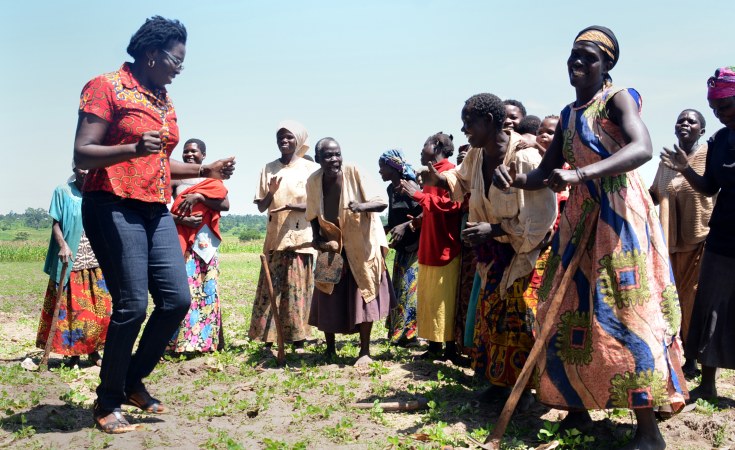Earlier this year, a video went viral on Ghanaian Twitter of six teen boys raping a young girl. Despite her resistance, these boys held her down and took turns. What haunted me most was their laughter.
Being a feminist activist means confronting this kind of raw ugliness on a daily basis. And it takes a toll. It is physically, mentally, and spiritually exhausting. Without healing, the accumulated trauma can push people out of our movement.
But there are also the magic times, when the unity of our voices and the force of our movement can be uplifting. Like that glorious moment on the 30th of June 2018, when thousands of Ugandans marched together to demand justice for the murders of more than 40 women, a trend in the country since 2015. Amidst drumming, dancing, and waving slogans, their united voices were heard all over the world: No more rape, No more killings, Women's Lives Matter.
History shows us that feminist activism creates social, political, and economic change that benefits people of all genders. For this reason, it is crucial that activists have the healing we need to keep going.
Right now, African feminist activists are working toward a world where all people can live free from violence, including sexual violence. Where all people have what they need to take care of themselves and their families with dignity. Where all people can be their full selves and determine their own destinies. Who wouldn't want that?
Empowering African women and promoting the realisation of their rights are critical milestones on the path to this better, more just world. And that's what the African Women's Development Fund does, by supporting courageous and dedicated women's organisations across the continent.
In Liberia, African Women's Development Fund grantee Zorzor District Women Care (Zodwoca) promotes women's land and property rights in a region where women's labour but not ownership of land is encouraged. In Benin, the Association des Femmes dans l'Education (FAWE Benin) is popularising the law on sexual harassment in response to the high incidence of sexual harassment of young girls in schools. And in South Africa, the Social, Health and Empowerment Feminist Collective of Transgender Women of Africa (SHE) is serving as a bridge for the better integration of trans women in the wider women's movement, and equipping them with advocacy skills. And these are just a few of the thousands of African women's organizations AWDF has supported since its inception, that are working in many ways to make the continent of Africa a better place for its women, and minorities.
But whether the work requires combing through rape reports, providing emotional support to a widow whose in-laws have just thrown her out of her house, or standing with a female political candidate who is being viciously trolled on social media, trauma builds up.
In Akan ontology, a person is more than their physical body—they are made up of at least three more aspects, the others quasi-physical or completely non-physical. This idea informs the general African approach to health: fully healing requires healing of the body, the mind, and the soul. To treat body aches, for example, a traditional priestess will provide both a physical cure for the body's ailments, as well as a ritual for mental and spiritual healing.
We want to bring such healing to African feminist activists.
That's why the African Women's Development Fund — with the NoVo Foundation's Radical Hope Fund and in partnership with AIR — is launching the Flourish Project, a three-year initiative that will strengthen feminist organising across Africa through these key interventions:
- Grounding through a pilot model of a retreat for African feminist activists facing burnout and stress, and in need of a reflective and healing space—designed and implemented in collaboration with AIR, a network of African practitioners developing transformative feminist approaches to trauma, emotional wellbeing, and mental health;
- Seeding inspiration for the growth of African feminist movements through intergenerational dialogues and documenting a generation of liberation-era feminist trailblazers; and
- Connecting feminist activists to convene and grow their organising at national and community levels linked to the African Feminist Forum.
The Flourish Project aims to refresh and tend to the vibrant movement of African feminists who have and will continue to shape the future of Africa. It is an investment in the deep movement work that needs support alongside frontline advocacy: the work of documenting and sharing our activist legacies, of finding durable ways to sustain activists working in hostile terrain, and of keeping movement strategy and base-building spaces alive.
Social movements drive social change. And sustainable movements depend on resilient activists. Those activists need space and time to heal—we will not see our feminist dream brought to reality without it.
The African Women's Development Fund wants funders, activists, and others in the movement to recognize that healing is just as radical and necessary as marching, protesting, or organising.
As the Black American feminist writer Audre Lorde said, "Caring for myself is not self-indulgence, it is self-preservation and that is an act of political warfare."


